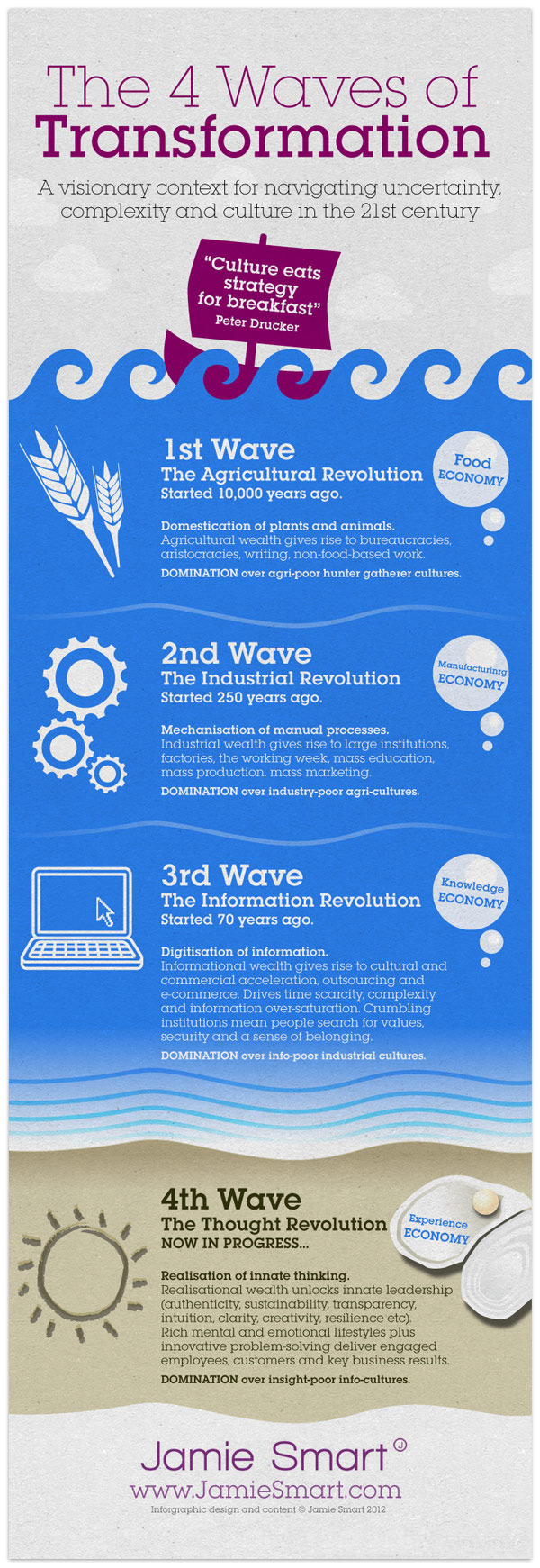Navigating in times of Uncertainty, Complexity and Chaos – Part Four
Photo courtesy of BenSpark
“A great lie is like a great fish on dry land; it may fret and fling and make a frightful
bother, but it cannot hurt you. You have only to keep still, and it will die of itself.”
bother, but it cannot hurt you. You have only to keep still, and it will die of itself.”
– George Crabbe
In part one, two and three of this series, we looked at the waves of transformation shaping humanity, and the role that an understanding of CLARITY can play in solving the challenges created by the third wave (the information revolution). In this article, we'll be looking at how you can have a realisation of CLARITY, and the part this plays in the fourth wave (the thought revolution).
The power of personal realisation
In part three, we explored a powerful distinction: Application (understanding how to do something) VS Realisation ( the understanding of how some aspect of the world already works). Realisation closes the gap between how we think life works, and how it actually works. This being the case, one of the most powerful realisations a person can have is an insight into the nature of CLARITY; an insight into how everybody's mind works.
Think about it: CLARITY creates our personal perceptual experience of life. As such, it plays a part in 100% of what happens to us and for us; thought is the often-overlooked “medium” we're using to live our lives. The 19th century realisation about germs and bacteria had an enormously positive effect on standards of health and hygiene, saving millions of lives. When you have a realisation / insight into how thought works, it can have an incredibly positive effect on every aspect of your life: work, home, family, relationships, health, goals, etc…
This is the case for every human being. A realisation about the nature of thought can have a bigger impact for your work in terms of creativity, productivity, security and resilience than any other factor. Just as the realisation that the earth travels around the sun had a transformational impact for medieval astronomers and astronomy, the realisation that we're always feeling our thinking has a transformational impact for human beings.
So how do you “have” a realisation into the nature of CLARITY?
Good news, bad news and great news
First, the good news: somewhere within your consciousness, you already understand CLARITY; you understood it intuitively as a child. Before you were exposed to layers of cultural conditioning and misunderstanding, you really “got” that all thought is illusion; the domain of pretend and make-believe.
Next, the bad news: there's nothing you can do to force that understanding to step more fully into your consciousness. Realisations and insights will free you from the outside-in misunderstanding and return you to a more profound connection with life. Those insights won't come “to order” – they'll show up when they show up.
Finally, the great news: if you keep looking in this direction and exploring the domain of CLARITY, you're guaranteed to have realisations that will help you. If you make this understanding a priority, then those realisations will happen sooner as well as later. (You can download these powerful free materials to support your exploration of CLARITY: The Ultimate Leverage Point as well as the other videos, blog posts and materials on www.JamieSmart.com)
The Fourth Wave
So what part does this all play in the fourth wave (the thought revolution) and the experience economy?
Just to recap…
1st Wave – The Agricultural Revolution (Food Economy) started 10,000 years ago
2nd Wave – The Industrial Revolution (Manufacturing Economy) started 250 years ago
3rd Wave – The Information Revolution (Knowledge Economy) started 70 years ago
4th Wave – The Thought Revolution (Experience Economy) starting now…
As mentioned previously, each successive wave is like accelerant for the wave before it:
– 2nd wave industry transformed 1st wave agriculture (Andrew Meikle's threshing machine, invented in 1784, was the first of many machines that significantly increased food production and reduced the need for manual labour).
– 3rd wave information technology transformed 2nd wave industry (from computer-aided design to industrial robots, information technology continues to change the way things are produced. The information revolution continues to impact agriculture too.)
– 4th wave understanding will transform the 3rd wave knowledge economy. Here's how…
The experience economy
There are already numerous signs that we're moving towards an “experience economy”. As people become more time-poor, attention-starved and values-focused, the quality of their experience of life becomes more important. As well as wanting to improve the overall quality of their day-to-day experience, people are seeking out pockets of experience, like oases in a desert.
– Starbucks have built a multi-billion dollar business based on encouraging people to carve 20-30 minutes out of an already-busy day so they can sit on a sofa drinking a 5-dollar coffee with their name written on the cup. A 20-30 minute experience, repeated daily for millions of people.
– The Apple Store has helped turn Apple into the most profitable company in the world by creating a beautifully designed in-store experience, and introducing people to beautifully designed, high-utility “lifestyle products”.
– Adventure tourism (adrenalin sports experiences), sacred travel (spiritual hotspots for new agers), extreme tourism (travel to very dangerous places) and eco-tourism (ecologically friendly travel) are all examples of people's willingness to pay for values-based experiences.
– The Warner Brothers Studio Tour in London generates over £100,000 in ticket sales per day from visitors who want to experience the sets, props and costumes from the Harry Potter films.
Of course, people's desire for enlivening, fulfilling, values-focused experiences is nothing new. Everything from churches and pilgrimages to ice-skating and roller-coasters cater to our desire for enriching experiences. The difference with the experience economy is the increasing number of people who are willing to pay an increasing amount of money to have these experiences. And this is where it gets really interesting…
The critical 4th-wave factor
There's one thing that effects the quality of experience a person has more than any other factor…
Your level of clarity; the state of mind you're in when you're having the experience!
Clarity is “the difference that makes the difference” when it comes to any experience:
– A couple go to a movie. One of them is fully engaged and loves it, the other is bored and distracted. The one who's engaged has a clear mind, the one who's distracted has a head-full of boring, distracted thinking.
– Six people are sitting in a business meeting. The difference between a grindingly dull waste of time and a productive, generative experience is the level of clarity of the participants.
– A family go on holiday to the Seychelles. 4 of them love it, but the teenage son finds it tedious. Clarity is what makes the difference.
And what influences your level of clarity more than any other factor? Your understanding of CLARITY. 100% of your felt experience of life is coming from your thinking in the moment. The more we see this, the more clarity we experience.
Of course, some events have the odds stacked in their favour, and naturally bring people into the moment. Extreme sports, roller-coasters, paint-balling, hot-air ballooning; these kind of events favour the adrenalin-rush and are far enough outside of most people's experience to bring them into the moment and clear their minds. But the person's experience is still coming from their thinking in the moment. Just as a person can be bored and distracted on the world's biggest roller-coaster, we can also be engaged and involved sitting in an empty room. 100% of our experience of life is coming from our thinking in the moment.
The value of an event is dependant on the quality of the experience the person has. And this is why this understanding is so fundamental to the experience economy. The quality of the experience a person has is 100% dependant on their level of clarity when they're having the experience.
As the information revolution continues to gobble up people's attention, the critical factor influencing their ability to enjoy any given experience will be their clarity.
So far in the experience economy, businesses have taken responsibility for managing more and more of the external aspects of a person's experience. Video-game designers have taken it a step further, and are masters of influencing the neural events that their players experience.
The future belongs to those who are willing to go one step further than that, and start influencing their customers understanding of how life works.
In the fifth and final article in this series, we'll look at some possibilities for how that's going to play out.

